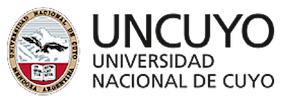Webinaire Université Nationale de Cuyo : Penser la crise du Covid-19 entre rupture et continuité : L'exemple de l'économie française
![]()

par Katia RADJA & Patrick SCHEMBRI
Vendredi 05 juin 2020, Mendoza, Argentine.
"Le monde post-Covid: opportunités de développement économique et durable". Tel est le titre du webinaire international organisé conjointement par le Service des Relations Internationales, la Faculté de sciences économiques et le Centre franco-argentin de l’Université de CUYO (UNCUYO) à Mendoza (Argentine), dans lequel des spécialistes français et argentins présentent leurs analyses sur la crise du coronavirus. Ce webinaire ouvre un cycle de conférences sur le monde qui succédera à la pandémie.
Dans le cadre de la première édition du 5 juin 2020, des experts argentins et français ont débattu de l'avenir de l'économie mondiale post-COVID-19 dans une perspective de développement durable. Dans le cadre de cet événement, Katia Radja et Patrick Schembri (Université Paris Saclay – UVSQ – CEARC) ont été invités à exposer leur analyse de la crise du coronavirus (Covid-19) et de ses impacts sur l’économie française. Katia Radja a présenté une communication intitulée « Quelle la part de nouveauté dans la crise du coronavirus ? ». La communication de Patrick Schembri portait sur « La crise du coronavirus entre rupture et continuité pour le monde d’après ».
Dans ces deux communications, l’analyse a porté sur le caractère multidimensionnel de la crise du coronavirus. Elle a également traité des voies possibles vers d’autres modèles de développement qui sont débattues en France dans la perspective d’un « monde d’après ». Certaines de ces voies sont centrées sur la promotion de nouveaux secteurs moteurs, une redistribution de la richesse produite et de nouvelles formes d’organisations du travail. La crise du coronavirus nécessite de traiter d’une manière quelque peu différente les questions relatives à la transition énergétique laquelle s’inscrit dans le respect de l’agenda climatique, et celles qui ont trait aux principaux liens (compromis et synergies) entre les objectifs du développement durable dans l’exercice de définition et de mise en œuvre des politiques de gestion de crise et post-crise. Ces questions de recherche sont notamment abordées dans le cadre de deux Initiatives de Recherche Paris-Saclay : l’IRS MOMENOM et l’IRS ACE-ICSEN.
![]()
![]()
![]()
![]()
![]()
Thinking about the Covid-19 crisis between rupture and continuity: The example of the French economy
by Katia RADJA & Patrick SCHEMBRI
Friday, June 5, 2020, Mendoza, Argentina
"The post-Covid world: opportunities for economic and sustainable development". This is the title of the international webinar organized jointly by the Department of International Relations, the Faculty of Economics and the Franco-Argentinian Center of the University of CUYO (UNCUYO) in Mendoza (Argentina), in which French and Argentinian specialists present their analyzes on the coronavirus crisis. This webinar opens a cycle of conferences on the world that would follow the pandemic.
As part of the first edition of June 5, 2020, Argentinian and French experts discussed the future of the post-COVID-19 global economy in a sustainable development perspective. As part of this event, Katia Radja and Patrick Schembri (Paris-Saclay University, UVSQ, CEARC) were invited to present their analysis of the Covid-19 crisis and its impact on the French economy. Katia Radja presented a paper intitled "What is new in the coronavirus crisis?". Patrick Schembri's paper focused on "The Covid-19 crisis between rupture and continuity for the world to come ".
In these two communications, the analysis mainly focused on the multidimensional nature of the Covid-19 crisis. It also relates to the possible paths towards other models of development which are debated in France in the perspective of a "world after". Some of these paths are centered on the promotion of new driving sectors, a redistribution of the wealth produced and new forms of work organization. In this respect, we are dealing with the impacts of the current crisis on the energy transition which is part of the climate agenda and the links (trade-off and synergies) between the Sustainable Development Goals in the definition and implementation of crisis and post-crisis management policies. These research questions are tackled in two Paris-Saclay Research Initiatives: IRS MOMENOM and IRS ACE-ICSEN.



